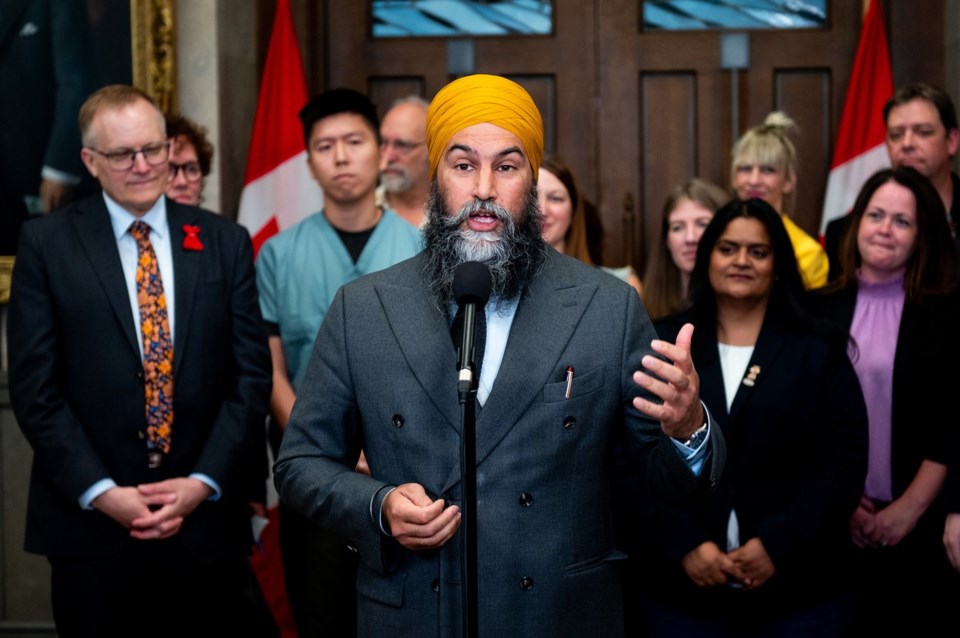OTTAWA — The federal New Democrats want a price cap on grocery store staples if the Liberal government can't convince grocers to bring down the prices themselves.
Some countries in Europe have implemented similar measures, and while it's something Industry Minister François-Philippe Champagne said he has looked into, he doesn't think it's a good idea.
"You have commodities which are traded on a global scale. So think about sugar, think about wheat, how can you have a price in one particular region," he said Tuesday.
"But I think the better way to do that is keep putting pressure on the grocers, on the large manufacturers around the world, and bringing more competition."
For months, the Liberals have been trying to get big grocers in saąúĽĘ´«Ă˝ to sign a code of conduct they say will bring down food prices for everyone.
And Champagne has even said he's trying to court a foreign grocer to usher in competition.
"I think it would help up shake up the market and bring better prices," he said.
Some food costs have recently eased due to a decline in inflation, but New Democrats say prices have not dropped nearly as much as they have risen in the past three years. They accuse grocers of being greedy.
"We're talking about an essential basket of goods that should be affordable for Canadians, and we want to force grocery stores to do that, otherwise we will impose a price cap," NDP Leader Jagmeet Singh proposed on Tuesday.
His party currently has a non-binding motion before the House of Commons that calls for such a measure, but it's not likely to pass.
Not only are Champagne and his fellow Liberals opposed to the idea, but the Conservatives are, too.
If "Sellout Singh" was truly interested in bringing down food prices, the NDP would support the Conservatives' quest to get rid of the carbon price, Conservative spokesman Sebastian Skamski said in a statement Tuesday.
Conservatives have been laser-focused on their "axe the tax" approach to improving affordability by scrapping the price on carbon, a key Liberal environmental policy.
Grocery prices have risen globally since 2021, driven by climate change, inflation, geopolitical risks such as Russia's war with Ukraine and, in saąúĽĘ´«Ă˝, a lack of competition among grocers.
Feeling the pressure, some governments in Europe have capped prices on staples or signed agreements with grocery stores to bring down costs.
Last year, the French government reached a three-month agreement with supermarket chains for them to cut prices on hundreds of staples and other foods.
Countries such as Hungary and Croatia also mandated price controls for items such as cooking oil, some pork cuts, wheat flour and milk, and Spain abolished all value-added tax on essential products and halved tax on cooking oil and pasta to five per cent.
"The benefit of being a laggard on this is that other countries have already imposed price caps, specifically with relation to groceries and in other areas as well, so we can look at other jurisdictions to see how they've done it," Singh said.
The leaders of Loblaw, Metro, Sobeys-owner Empire, Walmart saąúĽĘ´«Ă˝ and Costco have all faced questions from MPs over their profit margins amid high food inflation, which the grocers say they haven't unduly profited from.
Though grocery inflation has moderated significantly, reaching just 1.4 per cent in April, prices have risen 21.4 per cent over the past three years.
Last month, some shoppers boycotted Loblaw following a month-long campaign from frustrated consumers who are feeling the pinch and blame the grocery giant.
This report by The Canadian Press was first published June 4, 2024.
— With files from The Associated Press.
Mickey Djuric, The Canadian Press



